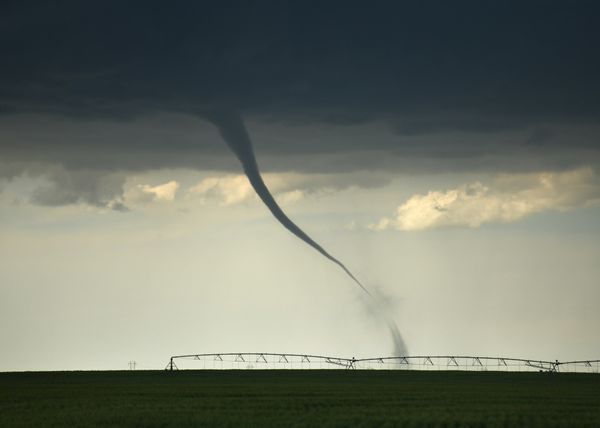Twisting Truths: Unraveling the Tornado of Post-Disaster Scams

Nowadays, the aftermath of a tornado extends beyond the physical wreckage, ushering in a storm of digital threats that exploit vulnerability and chaos. As the debris settles, a less visible but equally perilous landscape emerges—a maelstrom of scams maliciously designed to exploit those hit hardest by the storm.
This digital environment is prone to constant changes, unpredictable like the tornado itself. Aided by its puppeteers, the threat landscape evolves with each disaster to capitalize on the rush for recovery and rebuilding.
Tornado Season Scams
Communities strive to rebuild and recover after a tornado. However, the chaotic environment quickly becomes fertile ground for scams. From contractor scams to impersonations, threat actors are constantly finding creative ways to defraud unsuspecting victims.
By understanding and preparing for these scams, users can improve their strategies for safeguarding their assets and ensure a smoother recovery after a disaster. Our guide provides helpful insights into common scams that may arise after tornado season and practical steps for protection.
Common Scams Following Tornado Season
1. Contractor Scams (Storm Chasers)
After tornadoes, some contractors, commonly called “storm chasers,” sprout up to offer repair services to victims. While some may be legitimate, others could lack local licensing or fail to deliver promised services.
Scammers frequently contact critical victims of tornadoes, promising them quick services, including repairs, debris cleaning, or other types of services, often at discounted prices. Enticed by the possibility of dealing with the damages promptly and without breaking the bank, victims fall prey to these scammers.
Con artists demand upfront fees, claiming they need money to pay for materials, and either never show up for the work or perform subpar services before taking off with the money.
2. Roofing Scams
As its name suggests, in this scenario, crooks contact their victims, claiming to offer emergency roof inspections and repairs. After performing a bogus roof inspection, scammers may artificially inflate the seriousness and urgency of the situation, suggesting the victim repair the damages immediately to avoid further complications.
Triggered by the immediacy of the situation, victims often fold and accept the rogue contractor’s proposal, agreeing to pay whatever sum they demand just to make sure they’re in the clear.
To deter these scam attempts, verify the contractor’s credentials using trusted sources like the Better Business Bureau (BBB) website. You could also ask for a second opinion from your insurance company or other reputable roofers.
3. Impersonation and Emergency Scams
Scammers often masquerade as other people to sow confusion among victims. Sometimes, they impersonate government officials, utility workers, or insurance agents to solicit personal information or payments.
Other times, they may pose as close friends or relatives with tales of injuries and urgent financial needs. Following a tornado, it’s common for people to sustain injuries, face challenges in debris cleanup, or struggle with their recovery efforts. These real challenges provide scammers with believable scenarios to exploit.
To avoid being scammed by impersonators, independently verify their affiliation and always request identification. If you suspect that scammers are impersonating close friends or relatives, hang up immediately. Then reach out directly using the phone number you already have saved for them in your contacts to assess the situation.
Immediate Actions Post-Tornado and Their Importance in Scam Prevention
1. Safety check
After a tornado hits, it’s wise to ensure everyone’s safety as quickly as possible, including family members, pets and close friends. This immediate verification can shield you against emergency scams where fraudsters might claim a family member is in trouble and requires financial help for rescue or medical bills. By knowing the whereabouts and safety status of your loved ones, you can immediately recognize and dodge such scam attempts.
2. Assess and document damage
Thoroughly documenting damage before cleaning up or starting reparations is crucial not only for insurance claims but also for safeguarding against contractor scams. Con artists often weaponize the post-disaster chaos to convince homeowners of more severe damage or immediate repair needs. By having detailed, timestamped documentation of the actual damage, you can challenge fraudulent assessments by rogue contractors or inspectors who might maliciously exaggerate the situation.
Tips for Hiring Contractors
1. Research
Scammers often pose as contractors, especially after natural disasters like tornadoes. Using reliable resources like the BBB to research and review accredited businesses can help you avoid hiring fake contractors who might request an upfront fee and disappear, use subpar materials, or pad damage assessments to artificially inflate repair costs.
2. Estimates and contracts
Always request detailed written estimates and draft an ironclad contract with your contractor before starting the work. This builds a baseline that helps prevent overcharging and fraudulent claims while ensuring that the contractor is legally bound by the agreed-upon terms. Scammers often avoid clear contracts, preferring vague terms to exploit.
3. Payments
Con artists frequently request upfront payments. While some are more circumspect and go for smaller fees to avoid raising suspicion, others may request full payment upfront. By staggering payments, you ensure that the incentive for finishing the job remains. This strategy could protect you against a common scam where a rogue contractor receives an upfront payment and either never starts the work or abandons the project midway.
Insurance and Claims
1. Contact your insurance company
Communicate with your insurance company as early and as directly as possible to avoid scammers who might pose as insurance adjusters. Con artists often attempt to collect personal information or charge for assessments. Contacting your insurance company directly can get you a step ahead of the scammer; this way, you’ll know exactly when and whom to expect for assessments and even verify the identity of anyone claiming to be an adjuster.
2. Prevent fraud
Scammers could also weaponize fraudulent claims for pre-existing damages or ones that are not as severe as they make them appear. Checking the extent of your coverage and the claims process directly with your insurer will help you dodge scams where con artists might encourage you to file artificially inflated claims only so they could take a cut or charge you for unnecessary services.
Community Support and Resources
1. Local assistance
Taking advantage of local resources could give you a buffer against scammers who masquerade as charitable organizations or disaster recovery agencies. By using known and trusted community resources, you greatly reduce or even eliminate the risk of engaging with fraudulent entities that could be out for your personal information or money under the guise of providing assistance.
2. Dedicated software
Specialized solutions such as Bitdefender’s Scamio can help thwart these intrusions by giving you a second opinion on scams. Its AI-powered framework can quickly assess whether you’re about to walk into a scam by analyzing the input, whether it’s an email, a text message, an image, a QR code, or even a description of a given scenario.
Scamio is free and available on Facebook Messenger, WhatsApp and your web browser. You can also help others stay safe by sharing Scamio with them in France, Germany, Spain, Italy, Romania, Australia and the UK.
Conclusion
Recovery from a tornado is challenging and requires tremendous caution and solid decision-making skills; scams overcomplicate an already daunting situation. By being vigilant and taking proactive measures to verify information, using trusted resources, and hiring reputable contractors, you can keep scammers and their fraudulent attempts at bay and focus on recovery and rebuilding.
Frequently Asked Questions in Tornado Scams
- How do you stay safe in a tornado scam?
Staying safe in a tornado scam involves vigilance, informed decision-making, and timely verification of events and identities. Other strategies that could keep you safe from tornado scams include being skeptical of unsolicited help, securing personal information, using trusted channels for donations, and educating yourself and others.
- How to prevent emergency scams?
To prevent emergency scams, including ones that may follow tornado season, prioritize verifying caller identities, protecting your information, learning about common scams from trusted sources, avoiding rushing into decisions, especially when pressured, and using traceable payment methods.
- How do I block a scammer?
To block a scammer, you can use your phone’s blocking feature to restrict their number, report their number to your carrier, or use a third-party call-blocking app. This technique also works for text messages. If the suspected scammer contacts you through email or social media, you can mark the emails as spam or use the social media platform’s blocking option to restrict communication between you.
tags
Author

Vlad's love for technology and writing created rich soil for his interest in cybersecurity to sprout into a full-on passion. Before becoming a Security Analyst, he covered tech and security topics.
View all postsRight now Top posts
Torrents with Pirated TV Shows Used to Push Lumma Stealer Malware
November 14, 2024
What Key Cyberthreats Do Small Businesses Face?
September 06, 2024
FOLLOW US ON SOCIAL MEDIA
You might also like
Bookmarks








